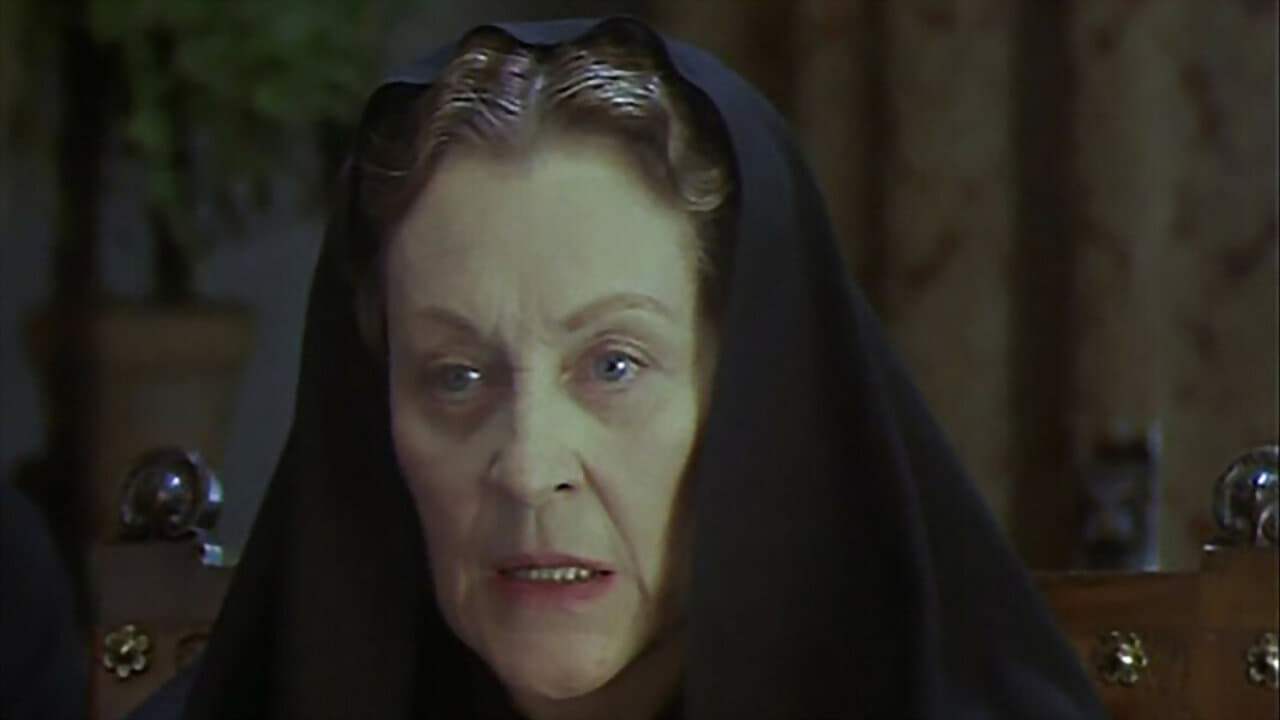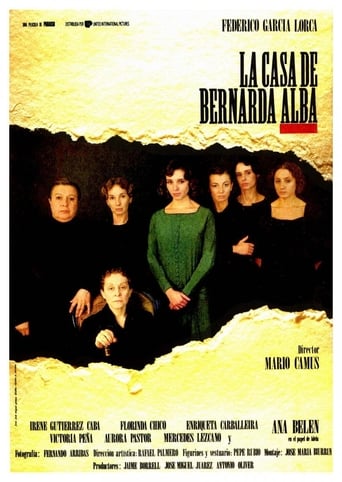ma-cortes
The House of Bernarda Alba was Lorca's last play, completed on 19 June 1936 , two months before Lorca's death during the Spanish Civil War (1936-1939). The House of Bernarda Alba (Spanish: La casa de Bernarda Alba) centers on the events of a house in Andalusia during a period of mourning, in which Bernarda Alba (Irene Gutierrez Caba) , aged 60 , wields total control over her five daughters . Bernarda exercises a tyrant's will over the household , including her followings daughters : Angustias ( Enriqueta Carballeira) , 39 years old , Magdalena (Aurora Pastor) , 30 years , Amelia (Mercedes Lezcano) , 27 , Martirio (Vicky Peña) , 24, and Adela (Ana Belén) , 20 years old . The housekeeper , called La Poncia (Florinda Chico) and Bernarda's elderly mother , María Josefa (Rosario García Ortega) , also live there . Bernarda desperate to uphold tradition carries out a strict observance of the funeral rites , and the differences between men and women . She creates an environment where her family is not permitted to pursue their desires and passions . Bernarda is preoccupied with the reputation of her family and is horrified by the idea of scandal and gossip , and she demands it be known that Adela died a virgin . Some of the characters' names represent symbols , such as : Bernarda Alba— from the Latin for "white" : often a symbol of purity that reflects Bernarda's thinking that she is above everyone else ; Amelia— From Latin and Old German for "industrious" ; Hebrew: "labor of God" ; Martirio—"martyrdom" ; Angustias—"anguishes" or "torments ; Adela—from the Spanish verb "adelantar" meaning "to go forward" or "to overtake" ; Magdalena—The Spanish name of Mary Magdalene and Prudencia—Suggesting the virtue of prudence. This is an intense drama of women in the villages of Spain that contains tragedy , class prejudice , authoritarianism and magnificent interpretations . Commentators have often grouped it with Blood Wedding and Yerma as a Lorca's "rural trilogy" . Lorca did not include it in his plan for a "trilogy of the Spanish land" , which remained unfinished at the time of his murder . The deliberate exclusion of any male character from the action helps build up the high level of sexual tension that is present throughout the play . Pepe "El Romano", the love interest of Bernarda's daughters and suitor of Angustias, never appears on stage . The picture explores themes of repression , passion , and conformity , and inspects the effects of men upon women . And then emerges the tragedy when Pepe El Romano is passionate for Adela , but is bound by economic necessity to court Angustias instead . Very good acting by Irene Gutiérrez Caba who represents the view that 'a woman's place is home' and uses money as a means of making herself superior, and views the villagers as unworthy of her daughters. Nice performance from Ana Belén as Adela who rebels against the tyranny of her mother . Special mention for Florinda Chico as Poncia who simply observes and does nothing to stop the unfairness in the household . Evocative cinematography that symbolizes dramatic aspects by Fernando Arribas . The motion picture was well directed by Mario Camus but in academic and claustrophobic style . It Won Goya Awards 1988 Best Production Design , Rafael Palmero , and Nominated Goya Best Lead Actress , Irene Gutiérrez Caba and Best Costume Design , Pepe Rubio , but failed at Box office .The play got several renditions , as film adaptations include : ¨Casa De Bernarda Alba¨¨(1972) with Rosenda Monteros , Ofelia Medina , Diana Bracho ; ¨La Casa Bernarda Alba¨ (1982) with Amparo Rivelles , Rosanda Monteros , Laura Cepeda , Magda Guzmán ; and its English made-for-TV movie The House of Bernarda Alba (1991) by Stuart Burge and Nuria Espert with Glenda Jackson , Deborah Findlay , Suzanna Hamilton ,Gillian Hanna , Joan Plowright ; 1991 Indian film directed by Govind Nihlani, Rukmavati ki Haveli . In 2006, the play was adapted into musical form , under the title Bernarda Alba, it opened at Lincoln Center Theater on March 6, 2006 , starring Phylicia Rashad in the title role .
rogermanning995
I had never heard of the play. I found this film to powerful for some of the same reasons the other people criticize it, particularly the claustrophobic feel. I wasn't sure I would watch the whole thing because it was such a disturbing/depressing story, but I ended appreciating the film very much by the end. Excellent casting, performances, and set design. This movie evoked real anger from me. Projection and denial are nasty human afflictions, and this film conveys that superbly. I don't know if that was the goal of the original play, maybe the film maker took liberties.
spelange
Especially if you've read the play, a lot of what the play does is explicitly gone against in the movie. For example, one key thing about the play is the absence of men, especially the absence of Pepe el Romano, yet throughout, there are silhouettes etc.. Also, ***SPOILER HERE*** at the end, as Adela is crying and thinking and going all slow-mo before killing herself, ALSO goes against the nature of the play. We're not supposed to know what's happening until we hear the loud noise offstage.Those are two key points. There are other stuff that's in the movie that wasn't in the play and vice versa, and it kind of takes away from the symbolism that Lorca utilizes in his play. Lorca is VERY symbolic and poetic, and by changing those parts, it ruins the movie.

